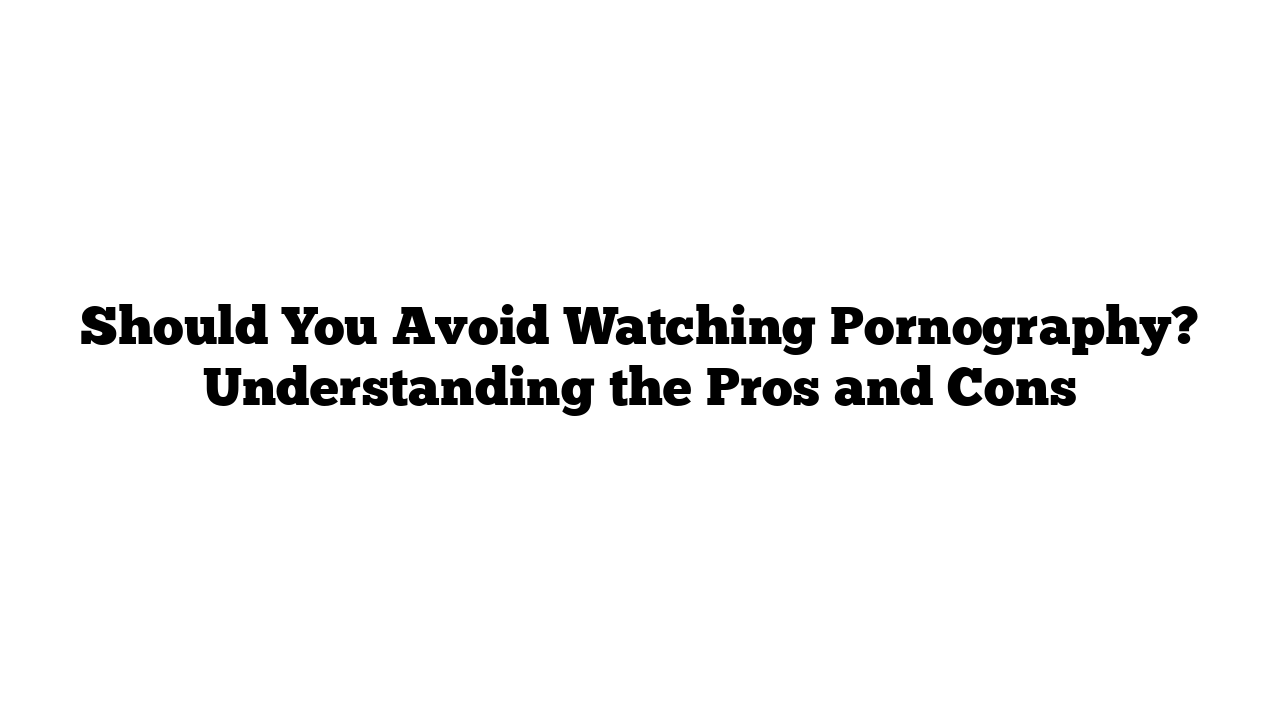Is pornography something you should avoid? This question is complex, and I’m here to provide a deeper understanding of the topic. Today we’ll explore the pros and cons of pornography use, helping you make an informed decision about your consumption.
Understanding Pornography: The Basics
Pornography is everywhere. Studies suggest that between 70% to 80% of men and about 32% of women have used pornography at some point. The COVID-19 pandemic even led to an 11% increase in traffic to pornography sites, highlighting its prevalence. People turn to pornography for various reasons, including:
- To increase sexual desire
- To satisfy curiosity about sex
- To learn about anatomy, given that sexual education is often limited or inadequate
The Good Side of Pornography
While there are concerns about pornography, there are also potential benefits. Research indicates that:
- Positive Attitudes Towards Sex: Pornography users may have more open and positive attitudes about sex, potentially leading to a more satisfying sexual life.
- Increased Sexual Satisfaction: For some, particularly women, viewing pornography can boost sexual satisfaction and libido.
- Bonding with Partners: Couples who watch pornography together often report greater dedication and sexual satisfaction in their relationships.
Interestingly, multiple studies have not found a direct link between pornography use and an increase in sexual violence or assault.
The Dark Side: When Pornography Becomes Problematic
So, when does pornography become an issue? Research indicates that 4% to 10% of individuals may experience problematic pornography use. While pornography addiction is not formally recognized as a disease, many in the medical field refer to it as problematic pornography use. Here are some factors that could indicate a problem:
- Excessive Use: Spending too much time watching pornography may lead to negative consequences in your life.
- Mental Health: Those with pre-existing anxiety or depression are at a higher risk of developing problematic use.
- Moral Conflict: If you feel that pornography is morally wrong yet still consume it, this incongruence can lead to issues.
- Preference for Pornography Over Real Sex: If you find yourself preferring masturbation to pornography rather than engaging with a partner, this could signal a problem.
The Science Behind Pornography Use
Watching pornography triggers the release of dopamine, a neurochemical that makes us feel good. This is similar to what occurs during sexual activity. Over time, excessive pornography consumption can lead to:
- Increased Cravings: Your brain may start craving pornography more than usual, similar to addictive substances.
- Tolerance: You might need to seek out more novel or aggressive content to achieve the same level of satisfaction.
- Compulsivity: Strong urges to watch pornography can lead to compulsive behavior, ignoring negative consequences.
- Impaired Executive Function: An overemphasis on pornography can lead to difficulties in performing everyday tasks and responsibilities.
Real-Life Implications of Problematic Pornography Use
When these changes occur in your brain, they can manifest in real life as:
- Social Isolation: Spending excessive time watching pornography can lead to avoiding friends and family, resulting in loneliness.
- Financial Issues: Increased spending on pornography can lead to financial stress.
- Mental Health Challenges: Prolonged use can lead to feelings of sadness, anxiety, and depression.
Impact on Sexual Development
The rise of pornography access among younger individuals is alarming, with boys reportedly accessing porn as early as 10 years old. Young brains may struggle to differentiate between the often unrealistic portrayals of sex in pornography and real-life experiences. These portrayals can lead to:
- Self-Esteem Issues: Young viewers may question their worth, comparing themselves to actors in pornography.
- Performance Anxiety: Pressure to perform like what they see on screen can lead to difficulties in real-life sexual encounters.
Finding Balance: Should You Avoid Pornography?
Ultimately, the decision to watch pornography is personal. It’s essential to weigh the pros and cons and be mindful of how it impacts your life, mental health, and relationships. If you feel that your pornography use is becoming problematic, it may be time to reconsider your habits.
In an upcoming articles, we’ll discuss strategies to reduce problematic pornography use.
If you found this article helpful, please leave a comment below with your thoughts. Remember, take care of yourself because you’re worth it!
